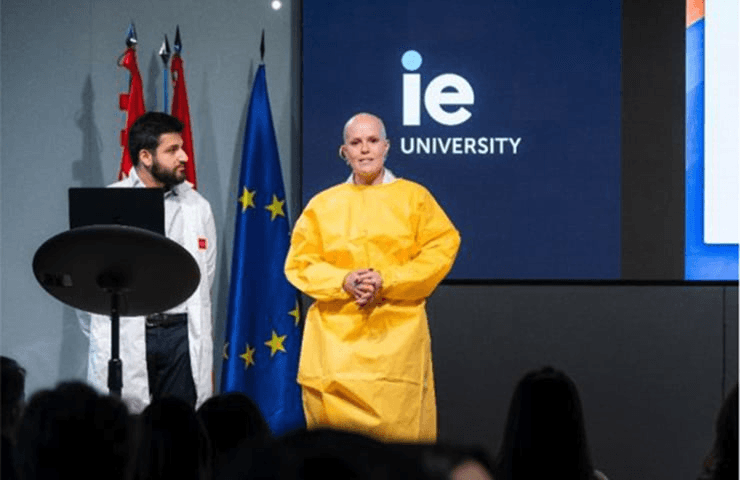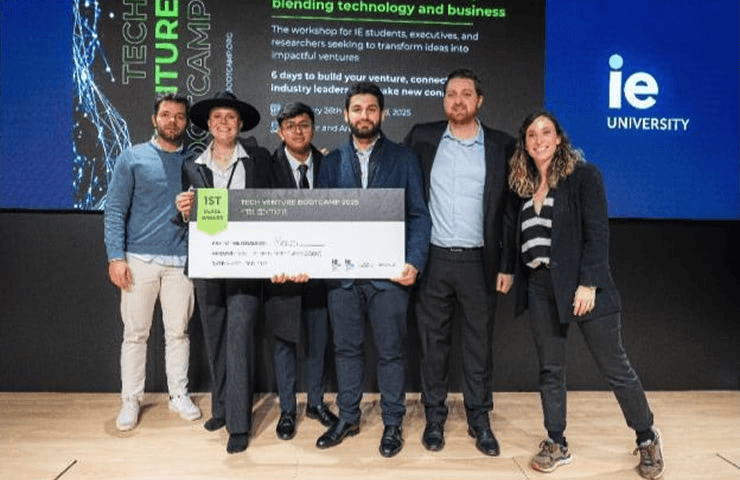Mentoring Healthtech Innovation: Ines Jimenez Fragoso on Guiding AI-Powered Startups at IE’s Tech Venture Bootcamp

Mentoring Healthtech Startups: How Ines Jimenez Fragoso Helped Shape a Winning Hospital Automation Solution at IE’s Tech Venture Bootcamp.
Healthtech is one of today’s most promising frontiers for innovation—combining data, AI, and real-world impact to solve major challenges in global healthcare systems. At IE Sci-Tech, student entrepreneurs are diving into that challenge, building practical solutions under the guidance of industry mentors.
We spoke with Ines Jimenez Fragoso, an Executive MBA alumna and mentor to the winning team at the Tech Venture Bootcamp (TVB). Anna Pokrovsky, Hrushikesh Gaikwad, Chingiz Saidov, and Shawn Peck developed and presented Hospi, an AI-powered predictive model created over the space of five days at the TVB, aiming to create a hospital administration automation system to transform healthcare efficiency across Europe.
With a career in healthcare and commercial roles spanning marketing, sales, and business development, Ines brings real-world insight to early-stage innovation.
What brought you to the TVB experience and why did you become a mentor?
I’m not an entrepreneur myself—I’ve always worked for big companies—but ever since I joined the IE community, my interest in entrepreneurship has been growing. I wanted to see how things were developing here, and I was encouraged to mentor, particularly in healthcare, because that’s where my expertise is. Healthcare has a significant barrier to entry for entrepreneurs, so having someone who really understands the industry is crucial. I joined the TVB hoping that someone would come up with an idea that could be applied to the healthcare sector.
So, you’ve been working with these teams for six days. Did you focus on one team, or were you mentoring multiple teams?
At the start, both mentors and teams were introduced to each other. After the teams pitched their initial ideas, we had the chance to connect and see if there was a good mentor-mentee match. I spoke to several groups, and after a few discussions, we decided where we’d best fit.
By the second day, the ideas became more concrete, and that’s when we finalized our mentorship pairings. One team I mentored originally had an idea related to manufacturing, and I challenged them by asking, “Have you considered applying this to the pharmaceutical sector?” They came back the next day with a completely new healthcare-focused concept, and I was really impressed by how quickly they pivoted. I could immediately see the potential there.
The other team I worked with was struggling with the commercial side of things. In my experience, many startups have fantastic ideas and great technology but lack a strong commercial approach. That’s often where they struggle the most. You can have the best solution, but if you don’t know how to bring it to market, your business won’t be successful.

What advice would you give to someone considering joining this program?
I’d say, just give it a try! It’s only a few days of commitment, but you’ll gain a lot of experience. The teams here have worked incredibly hard over the past six days, but it’s been worth it. Even if you don’t continue with a startup afterward, the experience will be valuable—whether for joining the Venture Lab or simply expanding your network. You’ll meet people from diverse backgrounds and industries, which is always a great opportunity.
Congratulations! One of the teams you mentored won first place in the Tech Venture Bootcamp, which is amazing. How do you feel about that?
I’m so proud of them! I feel like they were able to make everyone else see the potential I saw from the beginning. The key message from Ikhlaq Sidhu on day one was to “think big” and focus on ideas with clear impact. You can create a solution for something small, like a chair, but how does that really change the world?
"What I saw in this team was impact—potential impact. Healthcare solutions have the ability to transform lives, and scalability is another major factor. I told them from the start, ‘Your idea may be brilliant, but how do you commercialize it? How do you navigate the huge barriers in healthcare?"
One strategy we discussed was starting with a niche market. They focused on private hospitals and targeted a specific, high-priority pain point. That was key—solving an immediate, critical problem first, then scaling from there. The goal is to make people understand that while you’re solving one specific issue now, the potential applications are much larger.
Since they’re moving on to the Venture Lab, what advice would you give them for the next phase?

I’d encourage them to start building relationships with hospitals as soon as possible. Getting a hospital on board—even just one—will be a huge milestone. They need to work with real data because, right now, that’s what’s missing. Their idea has massive potential, but to validate it, they need real-world application.
They may need to start by offering their solution for free at first to get hospitals to adopt it, but that’s part of the process. I’d advise them to keep pushing forward with real-life testing and collaborations.
Do you think their business has a real chance of succeeding?
Absolutely. This is the direction the industry is moving in. So the question isn’t if it will happen—it’s who will make it happen first.
Why hasn’t it happened yet? Because the technology wasn’t quite there before, and because breaking into the healthcare industry is extremely difficult. Hospitals are very restrictive about working with new companies, so you need deep industry knowledge to navigate that landscape.
But whoever gets through those barriers will change the way hospital management systems work. It’s going to happen sooner or later—so why not them?